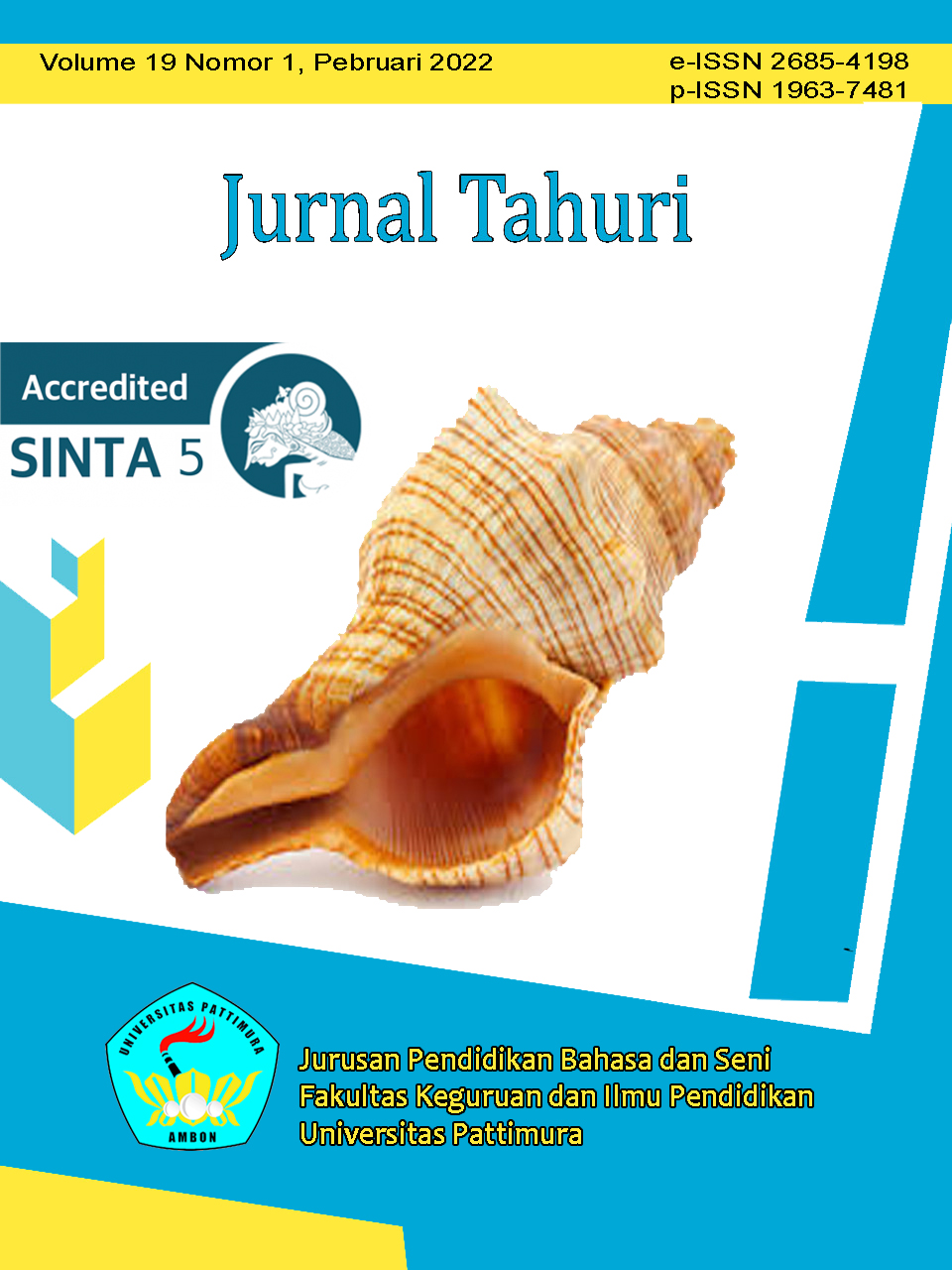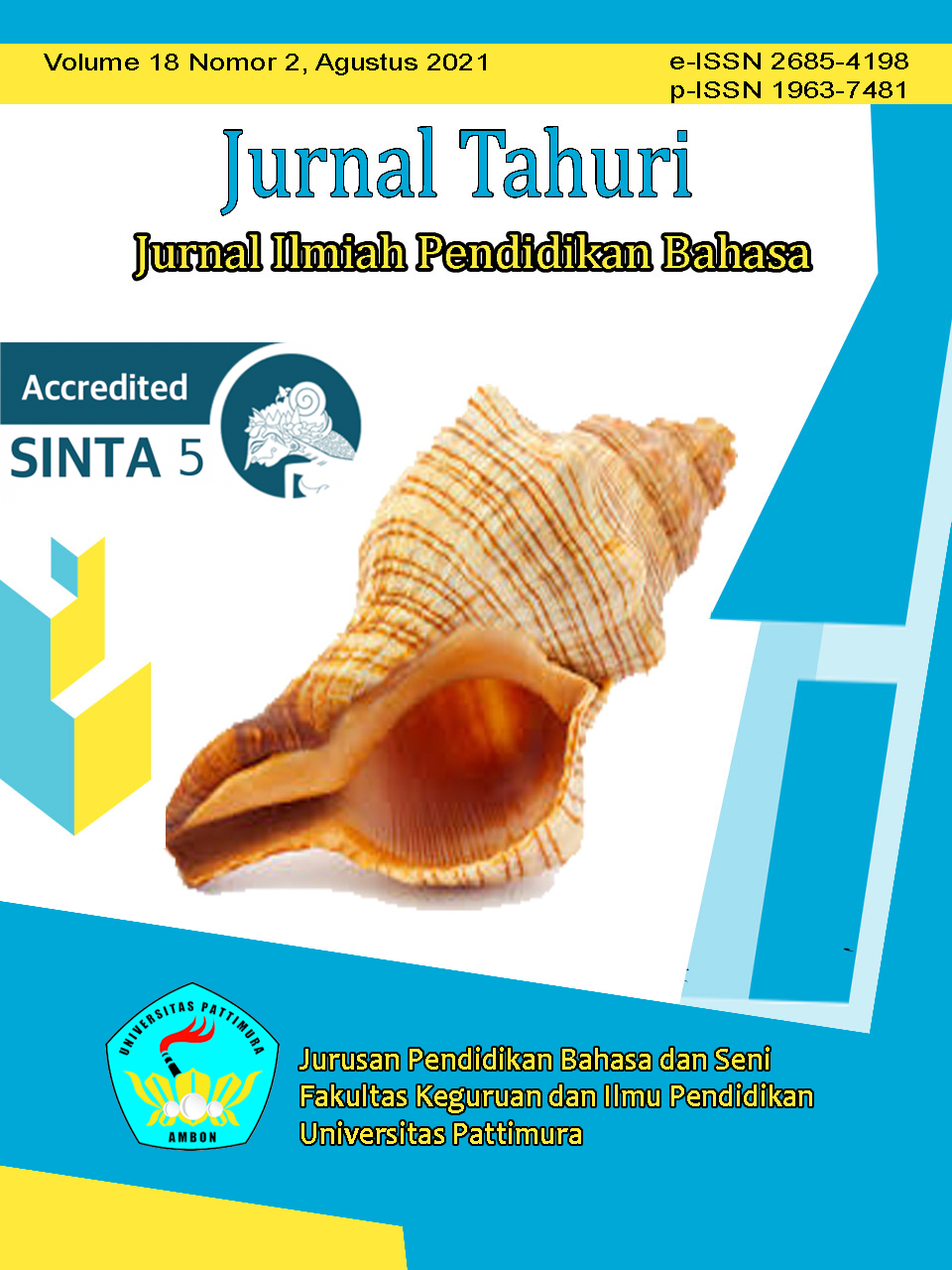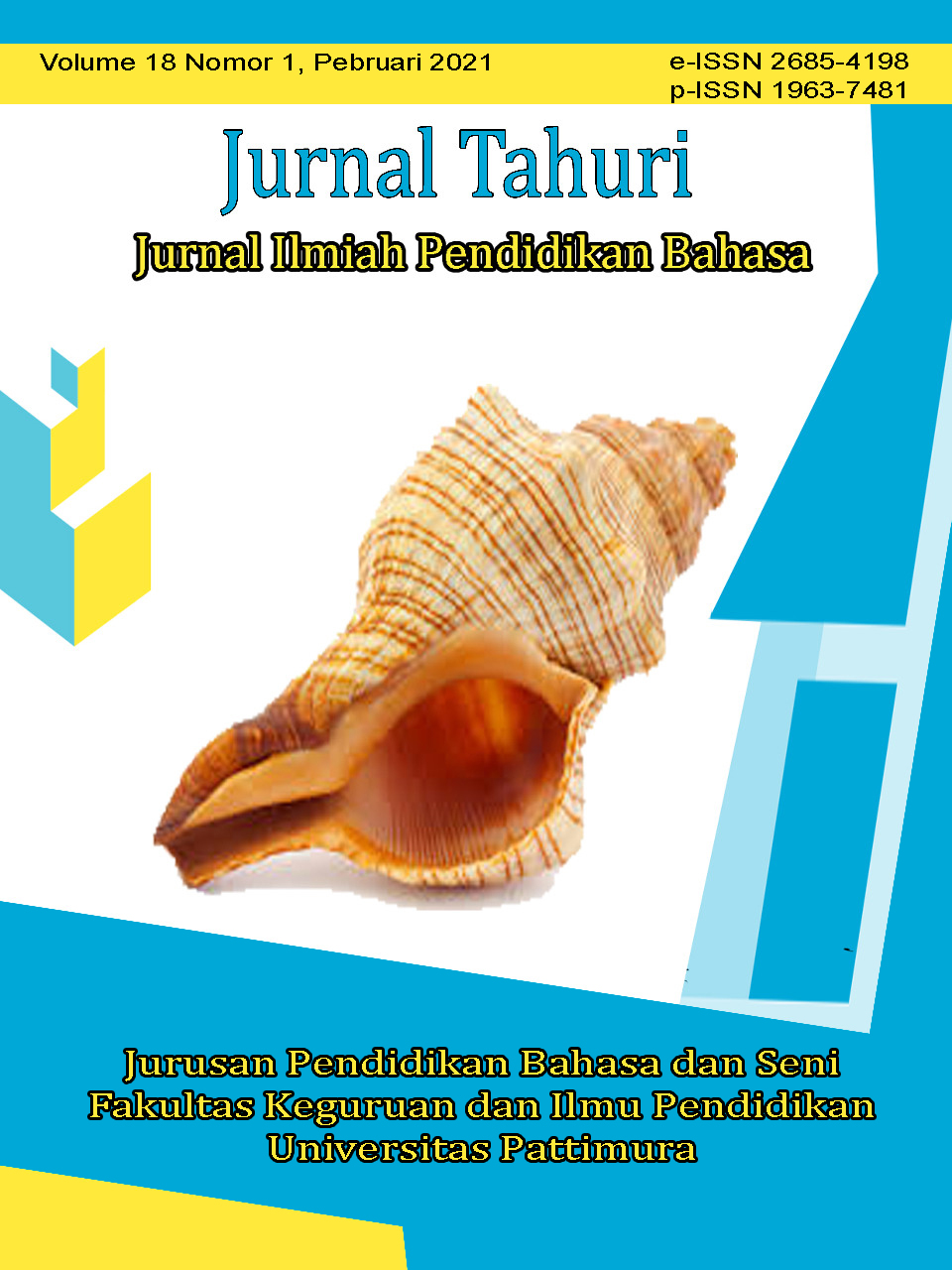| ..: MAIN MENU :.. |
| Register |
| Login |
| Reviewer |
| Focus and Scope |
| Editorial Team |
| Indexing |
| Contact |
| ..: SUBMISSION :.. |
| Author Guidelines |
| Submit Paper |
| Open Access Policy |
| Author Fees |
| ..: PUBLICATION :.. |
| Peer Review Process |
| Publication Ethics |
| Copyright Notices |
| Archiving Policy |
| Crossmark Policy |
| AI Tools Policy |
| Plagiarism |
| ..: ARTICLE TEMPLATE:.. |
| ..: INFORMATION :.. |
| Readers |
| Authors |
| Librarians |
| ..: TOOLS :.. |
| ..: STATISTIC VIEWS :.. |
|
|
-
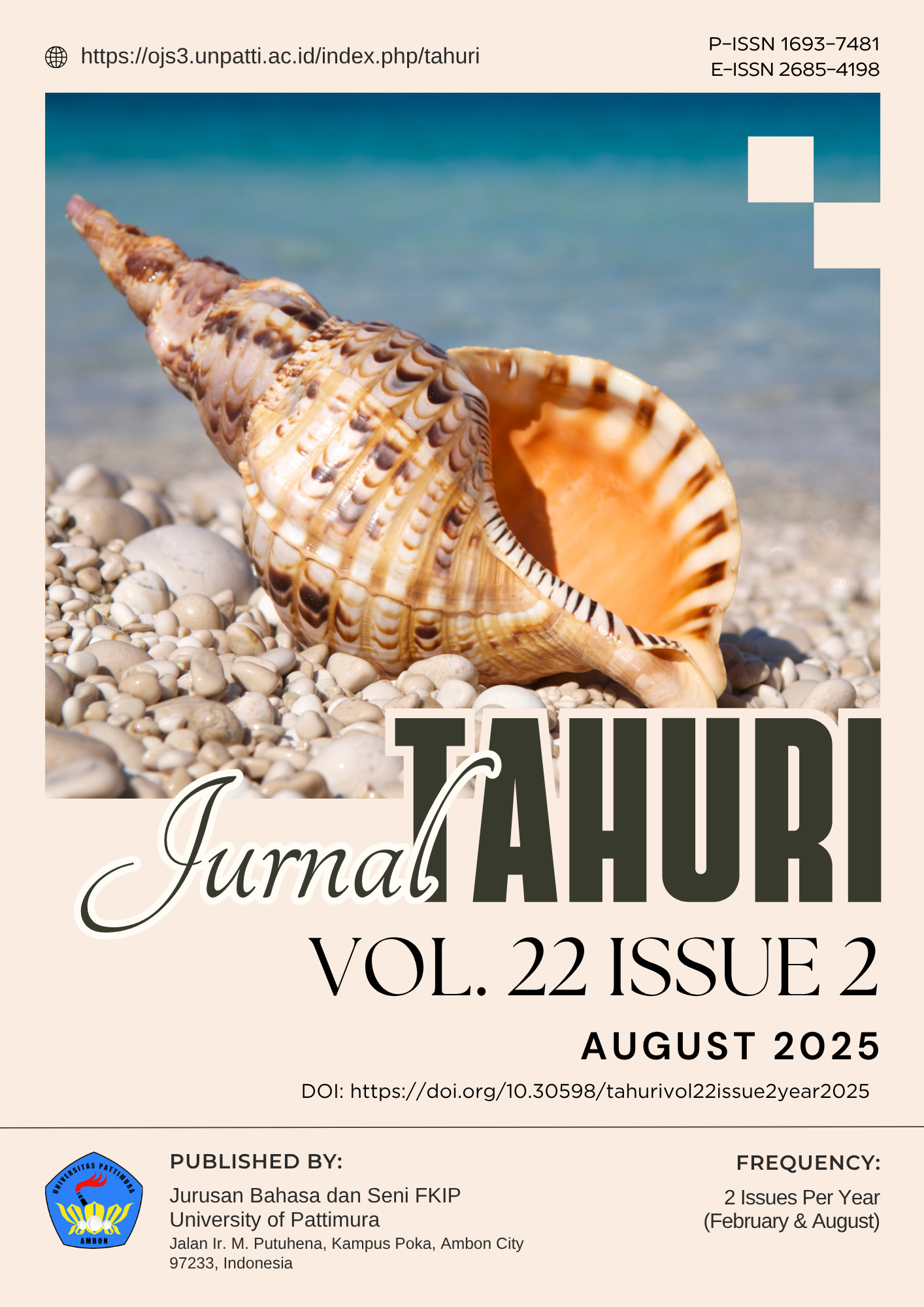 August 2025
Vol 22 No 2 (2025)
August 2025
Vol 22 No 2 (2025)The August 2025 issue of Jurnal Tahuri brings together five research articles authored by Indonesian scholars, each contributing to the growing body of work on language, identity, and learning in the context of contemporary Indonesia. This edition explores the intersections of digital culture, educational policy, sociolinguistics, and language pedagogy through both qualitative and quantitative perspectives. The articles in this issue address diverse yet interconnected themes. One study investigates digital gaming as an informal space for English language acquisition, highlighting how Indonesian youth develop identity, interaction, and fluency through online play. Another critically examines policy gaps and classroom realities in Indonesia’s English curriculum, while a sociolinguistic study explores perceptions of linguistic standardness and local features in academic writing among Ambonese students. Complementing these are an empirical exploration of mobile-assisted vocabulary learning via Duolingo across university disciplines, and an analysis of code-switching as a marker of social identity among Chinese-Indonesian students in urban educational settings. Collectively, these studies reflect Jurnal Tahuri’s enduring mission to advance research that bridges technology, culture, and education—promoting a nuanced understanding of how language practices evolve within Indonesia’s multilingual and digitally connected society.
-
 February 2025
Vol 22 No 1 (2025)
February 2025
Vol 22 No 1 (2025)The February 2025 issue of Jurnal Tahuri features five research articles authored entirely by Indonesian scholars, presenting fresh perspectives on the intersection of language, culture, and education in contemporary Indonesia. Each study offers an in-depth look at how linguistic and cultural practices shape pedagogy, identity, and literacy in diverse educational settings. The articles in this issue highlight a rich variety of themes. One explores humor and critical literacy through the lens of stand-up comedy in Indonesian language education, while another examines code-switching and critical pedagogy within Islamic boarding school classrooms, revealing how language use intersects with religious identity. Further contributions discuss teaching local wisdom through oral literature, focusing on teachers’ beliefs and practices surrounding petatah-petitih in Minangkabau culture; multilingual challenges in a Sundanese classroom, which reflect the negotiation between national language policy and local realities; and the integration of local folklore, using the Danau Toba narrative as a medium for enhancing cultural understanding in language education. Together, these studies underscore Jurnal Tahuri’s ongoing commitment to promoting culturally grounded and contextually responsive scholarship that bridges linguistic, educational, and cultural inquiry within Indonesia’s diverse multilingual landscape.
-
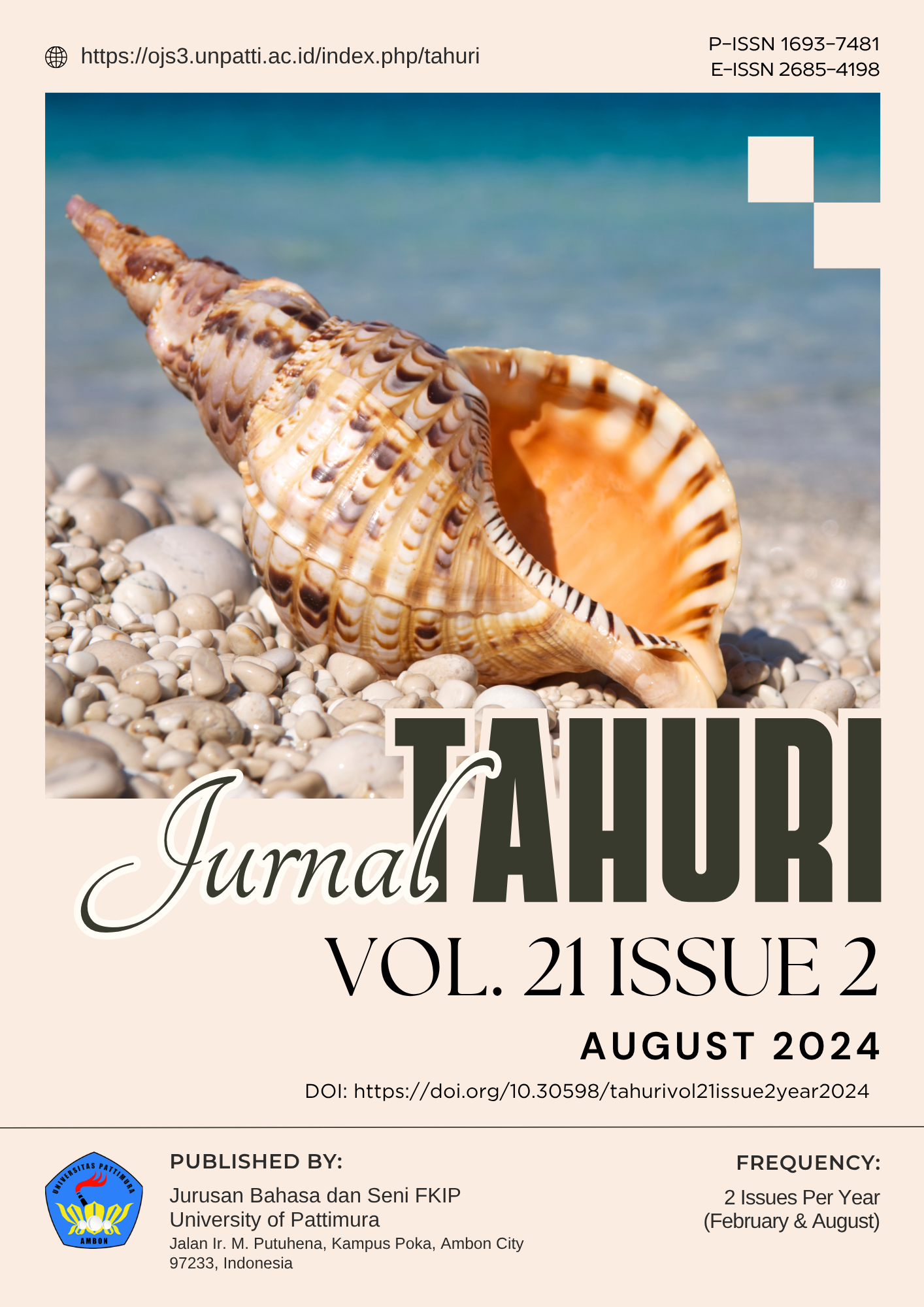 August 2024
Vol 21 No 2 (2024)
August 2024
Vol 21 No 2 (2024)The August 2024 edition of Jurnal Tahuri presents five scholarly articles that explore innovative approaches and current trends in English language learning and communication within the Indonesian context. Authored entirely by Indonesian researchers, this issue highlights diverse perspectives on language use, pedagogy, and learner engagement in both formal and informal educational settings. The featured studies cover a range of interrelated themes. One article investigates code-switching as a mediational tool in EFL classrooms, examining students’ attitudes, perceptions, and learning experiences. Another discusses Total Physical Response (TPR) as an integrated approach to motivation and early language development during the pandemic. The use of Task-Based Language Teaching (TBLT) through songs in secondary schools is also explored as a creative means of fostering engagement and comprehension. Additionally, this edition includes an analysis of English clubs as spaces for improving students’ speaking competence beyond the classroom, and a study on code-switching as a communicative strategy among Indonesian university students on social media. Through these studies, Jurnal Tahuri reaffirms its commitment to advancing meaningful dialogue in language education by showcasing research that bridges theory and practice, reflects local realities, and supports the continuous development of English language teaching in Indonesia.
-
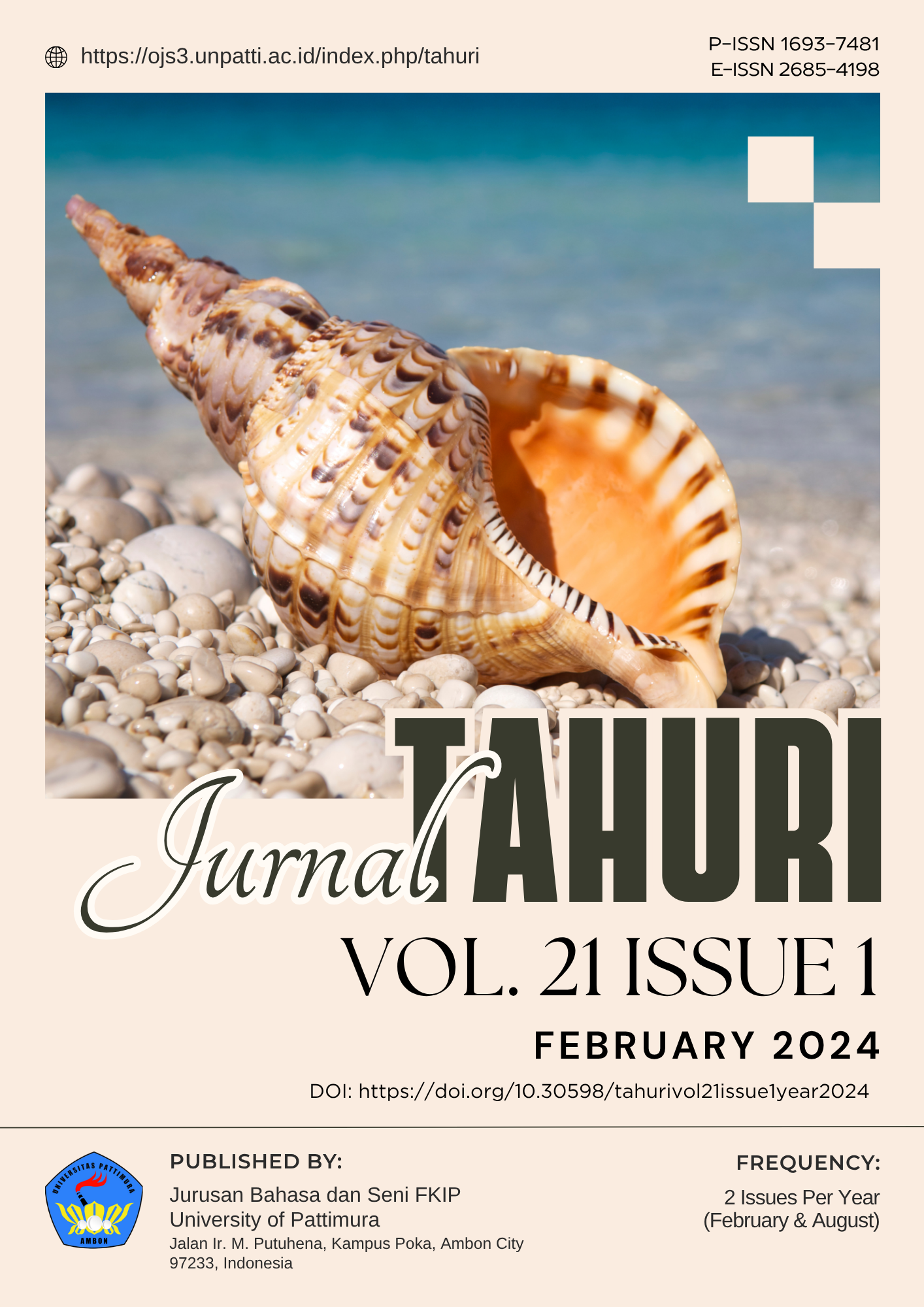 February 2024
Vol 21 No 1 (2024)
February 2024
Vol 21 No 1 (2024)The February 2024 edition of Jurnal Tahuri features five scholarly articles that reflect current developments in language-related studies and educational practice in Indonesia. Authored by 11 Indonesian researchers, this issue offers both theoretical and empirical insights into the dynamics of language learning, multilingualism, and community engagement in the preservation of local languages. The articles in this issue explore a wide range of interrelated topics, including the interplay between reading strategies and comprehension challenges among EFL learners, code-mixing patterns in the multilingual digital spaces of Ambonese social media users, and policy as well as community-based efforts to safeguard the linguistic heritage of Maluku. Other papers discuss the role of intrinsic motivation in building confidence through the “ASYIK” model for early English learning, and a grammatical error analysis of Indonesian–English translation to trace interlanguage development among junior high school students. Through its diverse perspectives and contexts, this edition reaffirms Jurnal Tahuri’s commitment to advancing critical discussions on language use, learning, and preservation within Indonesia’s multilingual landscape.
-
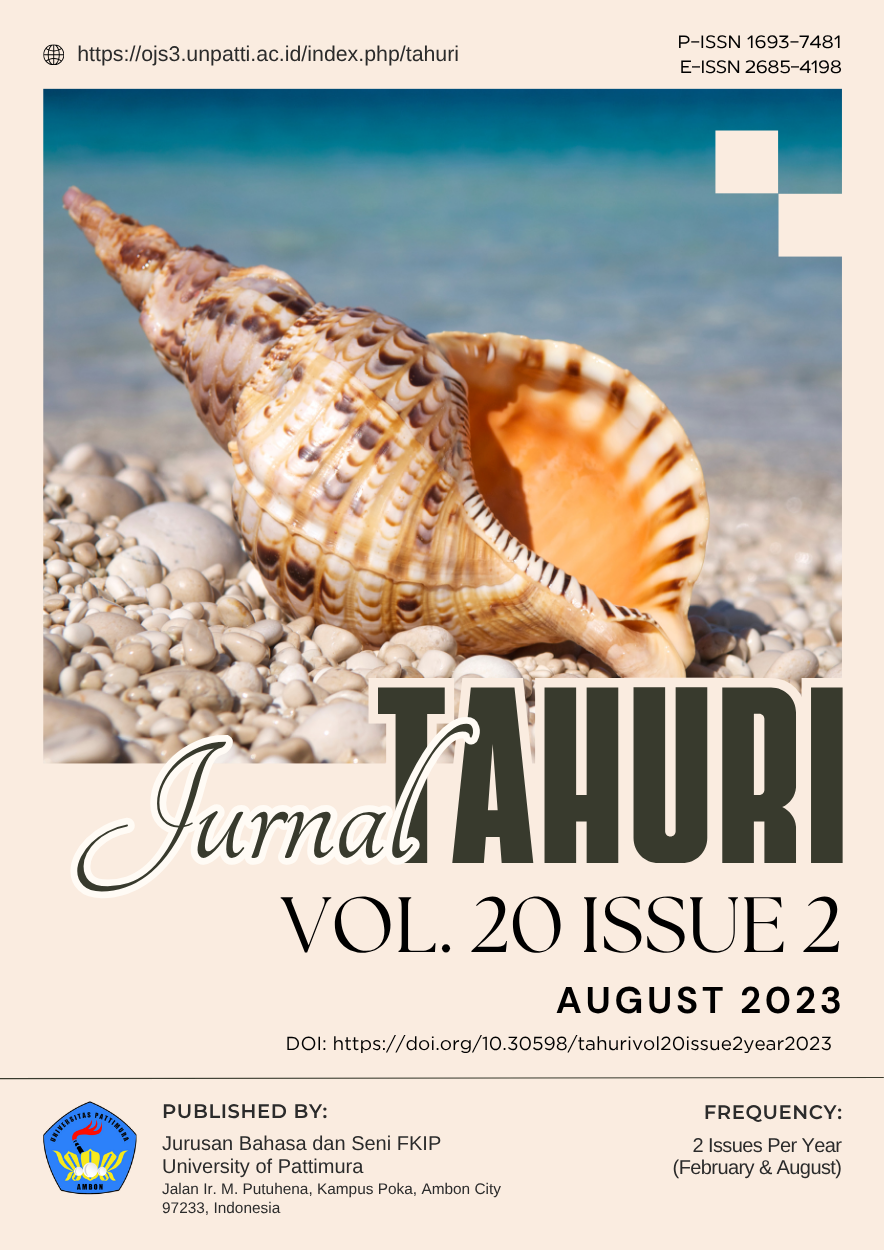 August 2023
Vol 20 No 2 (2023)
August 2023
Vol 20 No 2 (2023)The August 2023 issue of Jurnal Tahuri presents five insightful research articles that explore the dynamic intersections of language, identity, and education within Indonesia’s multilingual and multicultural contexts. This edition highlights how linguistic practices intersect with questions of culture, religion, and generational change, offering ethnographic and sociolinguistic insights from various Indonesian regions. The first article investigates students’ linguistic repertoires in multilingual Indonesian communities, revealing how language use reflects identity formation and educational experience. Another study from Ambon examines how multilingual youth negotiate identity in the overlapping spaces of urban and traditional life. From the Kei Islands, a paper on intergenerational language transmission illuminates how minority language speakers maintain linguistic and cultural continuity across generations. A further contribution explores language, religion, and identity negotiation in Islamic boarding schools, emphasizing the sociolinguistic complexity of faith-based education. The issue concludes with an analysis of intersecting voices of gender, religion, and language practices among university students in Eastern Indonesia, highlighting how language mediates power, belonging, and expression. Collectively, these studies demonstrate Jurnal Tahuri’s continuing dedication to advancing research on language, culture, and identity across Indonesia’s diverse linguistic landscapes.
-
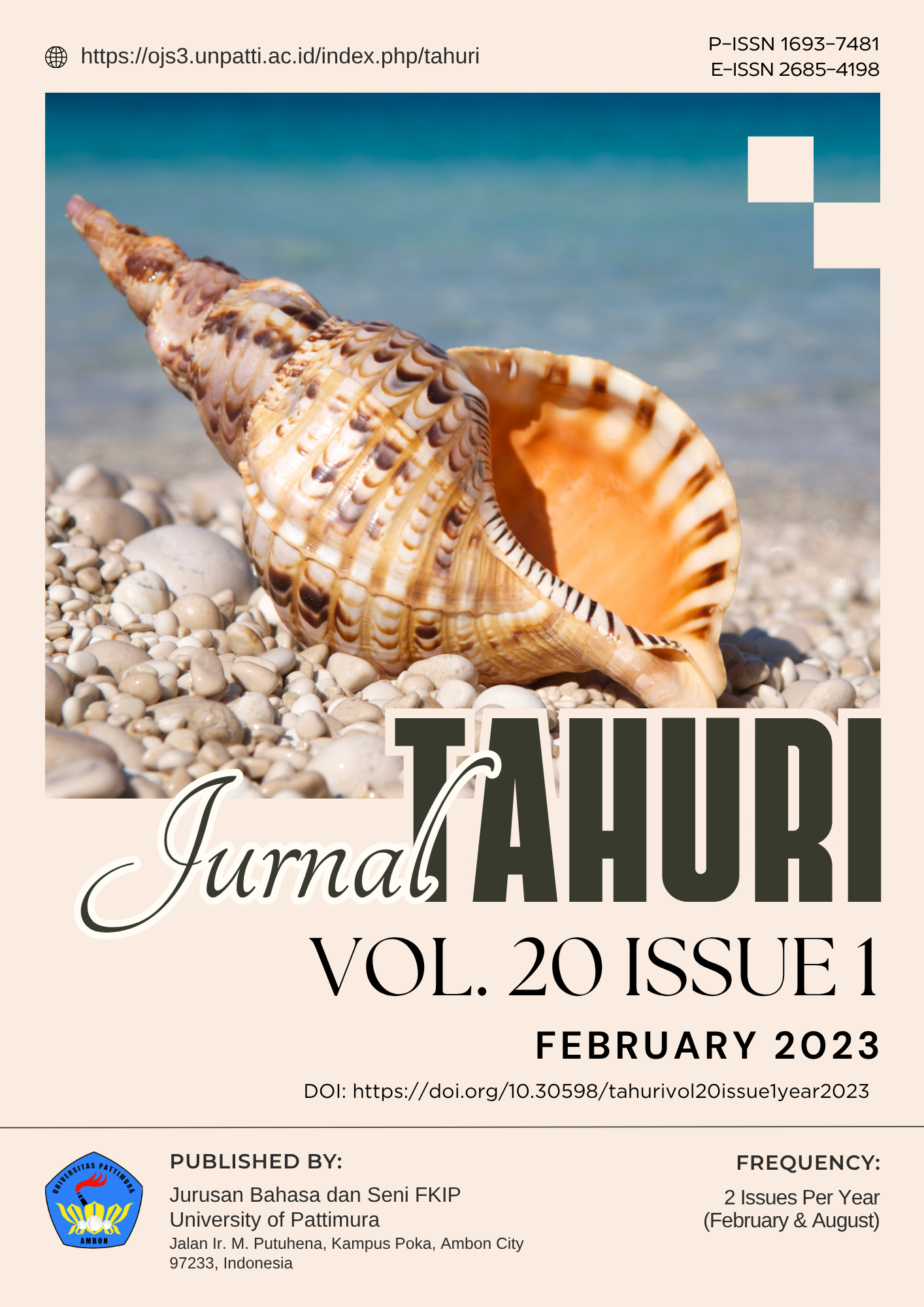 February 2023
Vol 20 No 1 (2023)
February 2023
Vol 20 No 1 (2023)The February 2023 edition of Jurnal Tahuri presents five scholarly articles that examine literacy, language, and pedagogy within Indonesia’s diverse sociocultural contexts. Written by Indonesian researchers, this issue explores how literacy practices and multilingual realities intersect in classrooms and communities across the archipelago. One article analyzes how home and school literacies interact to support early learning in rural settings, while another investigates the role of local culture-based literacy instruction in enhancing students’ critical reading skills in Eastern Indonesia. A third contribution focuses on cognitive and sociolinguistic strategies for improving reading comprehension in EFL classrooms. The issue also includes a study of language ideologies and policy implications in post-decentralization Indonesia, and a final paper that reimagines classroom literacy through translanguaging pedagogies in multilingual contexts. Through these studies, Jurnal Tahuri continues to highlight the evolving dynamics of language and literacy education in Indonesia, emphasizing culturally grounded, inclusive, and context-sensitive approaches to teaching and learning.
-
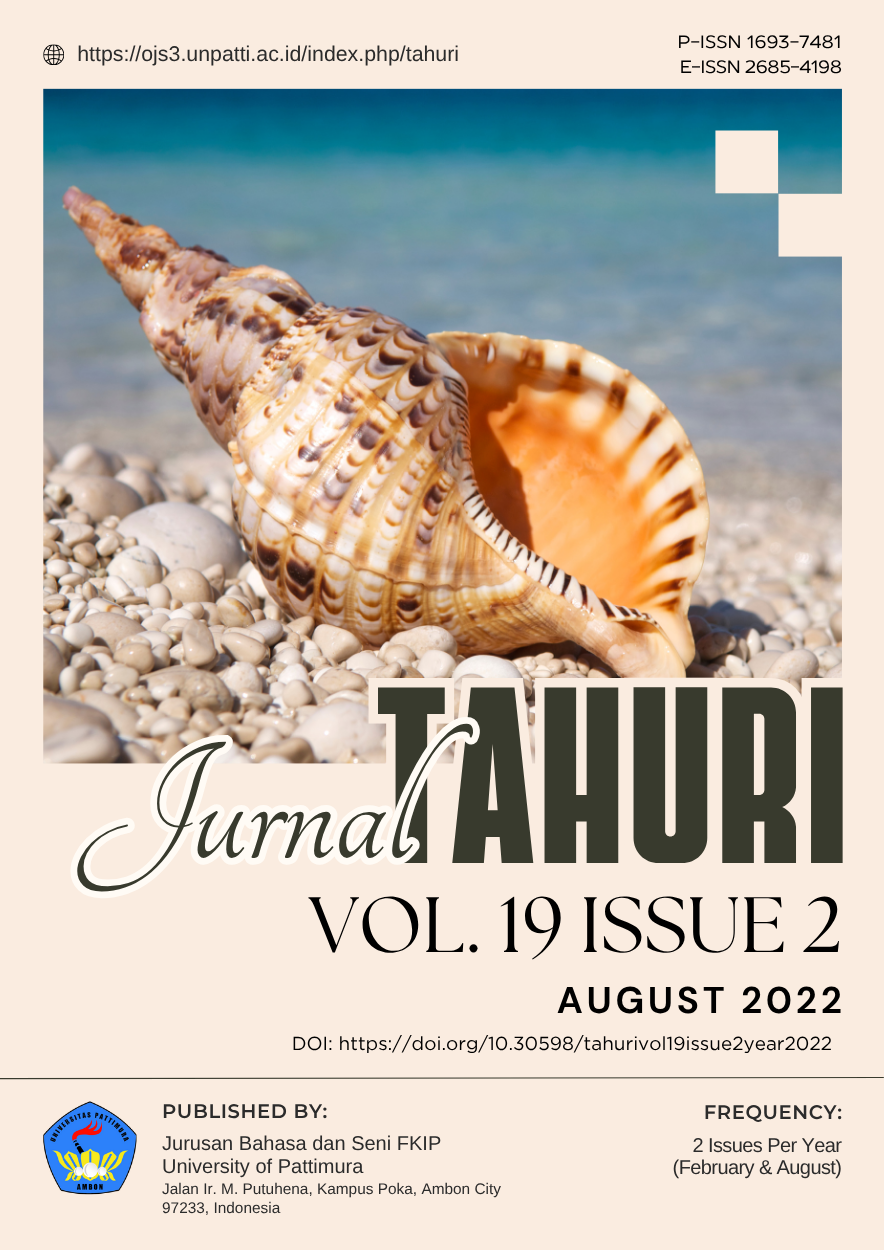 August 2022
Vol 19 No 2 (2022)
August 2022
Vol 19 No 2 (2022)The August 2022 issue of Jurnal Tahuri (Vol. 19, Issue 2) presents five research articles by Indonesian scholars, offering fresh perspectives on the dynamics of language, education, and culture in multilingual contexts. This edition highlights the intersections of language assessment, pedagogy, sociocultural traditions, and educational inequality in Indonesia. The first article examines practices, challenges, and needs related to Language Assessment Literacy among English teachers in Islamic secondary schools, shedding light on gaps between professional demands and available training. The second study explores translanguaging as a pedagogical strategy in multilingual English classrooms, demonstrating how teachers and learners negotiate meaning across linguistic repertoires. The third contribution focuses on mobile-assisted vocabulary learning, analyzing the use of HelloTalk by pre-service English teachers to expand lexical competence through digital interaction. Complementing this is a sociocultural investigation into integrating traditional Minangkabau performing arts, specifically Randai, with translanguaging pedagogy as a creative approach to English teaching. The issue concludes with a critical study on language ideologies and inequality, analyzing how linguistic hierarchies manifest in an elite multilingual school in Jakarta. Collectively, these articles underscore Jurnal Tahuri’s commitment to advancing scholarly conversations on language, identity, and education in Indonesia’s complex and evolving multilingual landscape.
-
 Jurnal Tahuri
Vol 15 No 2 (2018)
Jurnal Tahuri
Vol 15 No 2 (2018)Jurnal Tahuri merupakan jurnal ilmiah pendidikan bahasa, pada jurnal edisi volume 15 nomor 2 ini memuat 5 artikel

